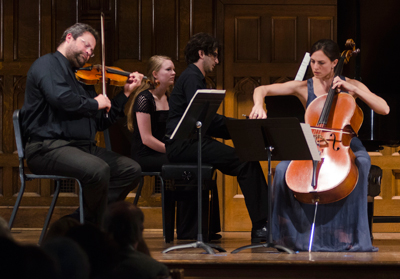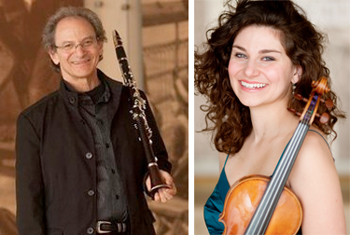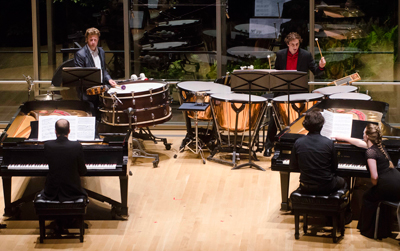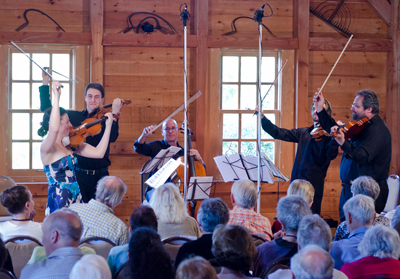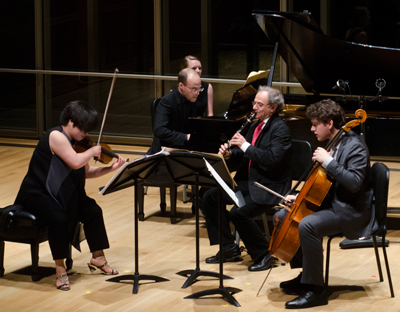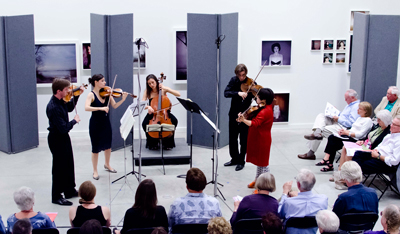by Mike Telin
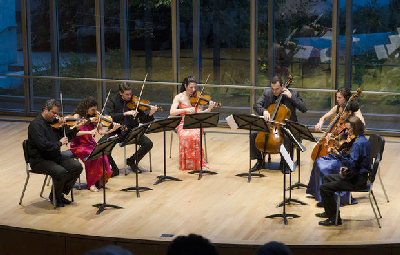
On Thursday, June 19 beginning at 8:00 pm in Mixon Hall at the Cleveland Institute of Music, ChamberFest Cleveland kicks off its third season with a concert titled Celebrate Three. “This festival has been fun to put together,” Diana Cohen told us during a recent telephone conversation. “We didn’t know exactly where ‘Three’ was going to take us, but I think it’s taking us to a lot of cool places.”
This year the festival has expanded to nine concerts and a new family program has been added. It also includes the world premiere of the first-ever, choreographed version of Tan Dun’s Ghost Opera for string quartet and Chinese pipa, in collaboration with Cleveland’s GroundWorks DanceTheater.
There will be many familiar faces performing during the festival: violinists Noah Bendix-Balgley and Amy Schwartz Moretti; violinists/violists Yehonatan Berick and Yura Lee; violist Dimitri Murrath; cellists Julie Albers, Gabriel Cabezas and Robert deMaine; percussionists Alexander Cohen and Scott Christian; pianist Orion Weiss; and commentator Patrick Castillo are all returning to the ChamberFest roster.
“We’re so proud to have all these great musicians back with us,” Franklin Cohen said, “and it’s been a big year for a few of our people. Dimitri Murrath won an Avery Fischer Career Grant, Yura Lee won first prize in the Munich Competition and Noah Bendix-Balgley was appointed first concertmaster of the Berlin Philharmonic. We didn’t create these people but I am proud of the fact that we identified them as great musicians and now the world has confirmed our enthusiasm for their work. Also, they’re all very down to earth.”
There will also be a few new faces on the ChamberFest stages this time around: violinists David Bowlin and Jinjoo Cho; violist Yu Jin; bassist Nathan Farrington; pipa player Gao Hong; oboists Alex Klein and Xiomara Mass; bassoonist Fernando Traba; percussionist Luke Rinderknecht; and pianists Roman Rabinovich and Carolyn Warner will all be making their ChamberFest debuts.
Diana and Franklin Cohen say they are both surprised by how quickly ChamberFest has developed. “It does amaze me, especially when I think about how the organization has developed over the three years,” Diana said, recalling the festival’s first year. “Then had young interns helping us every step of the way. We now have a great staff and a wonderful managing director in Jacqueline Taylor and the board is quite strong.” “We’re so grateful for all the foundation support as well,” added Franklin. “I had no idea that we would be in this position and I feel very lucky because the support is allowing us to do things like the Ghost Opera. So yes, I am amazed every day.”
We asked Diana and Frank if they could give us a guided tour of some of the highlights on this year’s programs.
Thursday, June 19 at 8:00pm in Mixon Hall — Celebrate Three
- Rachmaninoff Suite No. 2 for Two Pianos, Op. 17
- Kevin Puts And Legions Will Rise for Violin, Clarinet and Marimba
- Martinů Four Madrigals for Oboe, Clarinet and Bassoon, H. 266
- Fauré Quartet for Piano and Strings in C minor No. 1, Op. 15
DC: We have been wanting to program the Rachmaninoff since the first year. It’s a big piece and a great way to begin the festival.
FC: I first encountered Kevin Puts’s piece through a student from Serbia who had a jazz group of violin, clarinet and marimba. They played it on his recital and I thought it was really cool. It’s a fun piece, not complicated but very fresh. And I can’t wait to play with marimba because I’ve never done that before.
Friday, June 20 at 8:00pm in Harkness Chapel — Mélange à Trois
- HaydnTrio for Piano and Strings No. 39 in G major, Gypsy Rondo
- Kodály Serenade for Two Violins and Viola, Op. 12
- ZelenkaTrio Sonata No. 5 in F major, ZWV 181
- Paul SchoenfieldTrio for Clarinet, Violin, and Piano
DC: We’re trying to show all that a trio can be because it can be so many different things. The program also has a little bit of a gypsy element to it. The Kodály is one of my favorite pieces. It’s amazing and is not played enough.
FC: The ZelenkaTrio is very virtuosic for the oboes and the bassoon and is one of those pieces where there is no room to breathe. And I’m really looking forward to hearing Fernando playing it on Lynette’s bassoon and performing a piece that she loved.
Saturday, June 21 at 11:00am at MOCA — Triple Scoop
An interactive hour of musical fun, made exclusively for 6 to 12-year-olds and their grown-ups. Be forewarned, your host, the Grammy-Award winning oboist and teacher extraordinaire, Alex Klein, may ask you to “blow a double reed like a penalty whistle at a soccer game!” A surprise group of other CFC musicians will join the festivities.
FC: I knew Alex when he was a student at Oberlin, and after he got the job in the Chicago Symphony we kept in touch. He’s a great player and has this amazing El Sistema-inspired program going on in Brazil now. I think he has a special knack for working with kids, and when we mentioned a children’s concert he grabbed the ball as fast as he could.
Saturday, June 21 at 5:00pm at MOCA — Harmony of Numbers
- XenakisKottos for Solo Cello
- Bach Goldberg Variations arranged for String Trio
DC: The idea was to program something ultra-modern against the Bach Goldberg Variations arrangement — which I think sounds very modern in its own way — and both have an architectural element to them. Xenakis was an architect as well as a composer and Kottos is a really crazy piece that only lasts about ten minutes. I’m very excited about this concert and it will be very nice to be at MOCA for the first time. It’s a modern program for a modern space.
Sunday, June 22 at 3:00pm in Dunham Tavern — Revolving Thirds: From Darkness to Light
- MozartQuartet for Oboe and Strings in F major, K. 370
- PendereckiQuartet for Clarinet and String Trio
- Schubert String Quartet No. 15 in G major, D. 88
DC: The program is based around the Schubert quartet. I feel the piece is a monument that weaves back and forth between major and minor — darkness and light — which also inspired the first two works on the program.
FC: I find this concert fascinating! Alex starts it off with the Mozart, which is so upbeat and delightful, and then I follow with the Penderecki, which couldn’t be a starker contrast to the Mozart. It’s dark and serious. It comes out of that Eastern European body of music that is so tortured, but it has an incredible haunting beauty to it.
Wednesday, June 25 at 8:00pm at The Wine Spot — Snap! Crackle! Pluck!
- Kenji Bunch The Three G’s for Viola
- Edgar Meyer Meyer-Bell No. 3 for Violin and Bass
- Min Xiao-Fen ABC (American-Born Chinese) for Solo Pipa; Tan Tan, Chang Chang (Playing and Singing) for Ruan and Vocals
- David Bruce Movement from Gumboots for Clarinet, Violins, Viola and Cello
DC: The Meyer is just a fun duo written for Edgar Meyer and Josh Bell, as the title implies, and the Bunch is a great piece. It’s kind of a hoedown that uses a lot of extended violin and fiddling techniques. What I like is that it’s a program of all living composers that is just pure fun.
Thursday, June 26 at 8:00pm in Mixon Hall — Love Triangle
- Clara SchumannRomances for Violin and Piano, Op. 22
- Robert SchumannFairy Tales for Clarinet, Viola and Piano, Op. 132
- BrahmsQuintet for Piano and Strings in F minor, Op. 34
DC: The Clara Schumann is played very infrequently and was written around the time that Robert was institutionalized. At the concert, we’ll be reading letters all three composers wrote to each other. Hopefully this will offer a new light into their lives.
Friday, June 27 at 8:00pm at Fairmount Presbyterian Church — Three Bouncing Czechs
- Janáček Sonata for Violin and Piano
- Schulhoff Sextet for Two Violins, Two Violas and Two Cellos
- Dvořák Piano Quartet No. 2 in E flat major, Op. 87
DC: The Schulhoff is so cool, and again is not performed enough. I wish he had lived longer because I can’t imagine what direction his music would have gone. It’s a very interesting and colorful piece. The Janáček Sonata is such a powerful work and Noah and Orion have been wanting to do it together for a while.
Saturday, June 28 at 8:00pm in CIM Kulas Hall — Ghost Opera: Past, Present, Future
- Shostakovich Trio for Piano and Strings in E minor No. 2, Op. 67
- Tan Dun Ghost Opera with GroundWorks DanceTheater.
DC: This is out biggest production to date. We’ve been throwing around the idea of collaborating with David Shimotakahara for a while and this the first time we’ve included a pipa in the festival. Gao Hong is a wonderful player and the opera also requires her to do a little bit of singing,
FC: I’ve known Yo-Yo Ma for many years and he’s featured Tan Dun’s music in his concert presentations. So I started listening more to his music and I found this piece and told David about it. After listening, he said he really wanted to choreograph it. I think it’s going to be great and I can’t wait to see it — I don’t play that concert so I will be able to sit in the audience.
Sunday, June 29 at 3:00pm in Mixon Hall — 3X
- Golijov Last Round for Two String Quartets and Bass
- Beethoven Trio for Piano and Strings in D major Op. 70, No. 1 “Ghost”
- Tchaikovsky String Sextet in D minor “Souvenir de Florence,” Op. 70
DC: The program is a combination of three, six and nine. I’ve wanted to do the Golijov for a long time. It’s like a battle between two string quartets with the bass in the middle.
FC: The Souvenir de Florence is just such a nice way to send everyone off into the summer with a smile.
ChamberFest performance photographs by Gary Adams.
Published on ClevelandClassical.com June 5, 2014.
Click here for a printable copy of this article.




